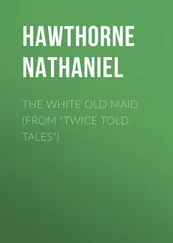Ascending into this natural turret, I peeped in turn out of several of its small windows. The pine-tree, being ancient, rose high above the rest of the wood, which was of comparatively recent growth. Even where I sat, about midway between the root and the topmost bough, my position was lofty enough to serve as an observatory, not for starry investigations, but for those sublunary matters in which lay a lore as infinite as that of the planets. Through one loophole I saw the river lapsing calmly onward, while in the meadow, near its brink, a few of the brethren were digging peat for our winter’s fuel. On the interior cart-road of our farm I discerned Hollingsworth, with a yoke of oxen hitched to a drag of stones, that were to be piled into a fence, on which we employed ourselves at the odd intervals of other labor. The harsh tones of his voice, shouting to the sluggish steers, made me sensible, even at such a distance, that he was ill at ease, and that the balked philanthropist had the battle-spirit in his heart.
“Haw, Buck!” quoth he. “Come along there, ye lazy ones! What are ye about, now? Gee!”
“Mankind, in Hollingsworth’s opinion,” thought I, “is but another yoke of oxen, as stubborn, stupid, and sluggish as our old Brown and Bright. He vituperates us aloud, and curses us in his heart, and will begin to prick us with the goad-stick, by and by. But are we his oxen? And what right has he to be the driver? And why, when there is enough else to do, should we waste our strength in dragging home the ponderous load of his philanthropic absurdities? At my height above the earth, the whole matter looks ridiculous!”
Turning towards the farmhouse, I saw Priscilla (for, though a great way off, the eye of faith assured me that it was she) sitting at Zenobia’s window, and making little purses, I suppose; or, perhaps, mending the Community’s old linen. A bird flew past my tree; and, as it clove its way onward into the sunny atmosphere, I flung it a message for Priscilla.
“Tell her,” said I, “that her fragile thread of life has inextricably knotted itself with other and tougher threads, and most likely it will be broken. Tell her that Zenobia will not be long her friend. Say that Hollingsworth’s heart is on fire with his own purpose, but icy for all human affection; and that, if she has given him her love, it is like casting a flower into a sepulchre. And say that if any mortal really cares for her, it is myself; and not even I for her realities, — poor little seamstress, as Zenobia rightly called her! — but for the fancy-work with which I have idly decked her out!”
The pleasant scent of the wood, evolved by the hot sun, stole up to my nostrils, as if I had been an idol in its niche. Many trees mingled their fragrance into a thousandfold odor. Possibly there was a sensual influence in the broad light of noon that lay beneath me. It may have been the cause, in part, that I suddenly found myself possessed by a mood of disbelief in moral beauty or heroism, and a conviction of the folly of attempting to benefit the world. Our especial scheme of reform, which, from my observatory, I could take in with the bodily eye, looked so ridiculous that it was impossible not to laugh aloud.
“But the joke is a little too heavy,” thought I. “If I were wise, I should get out of the scrape with all diligence, and then laugh at my companions for remaining in it.”
While thus musing, I heard with perfect distinctness, somewhere in the wood beneath, the peculiar laugh which I have described as one of the disagreeable characteristics of Professor Westervelt. It brought my thoughts back to our recent interview. I recognized as chiefly due to this man’s influence the sceptical and sneering view which just now had filled my mental vision in regard to all life’s better purposes. And it was through his eyes, more than my own, that I was looking at Hollingsworth, with his glorious if impracticable dream, and at the noble earthliness of Zenobia’s character, and even at Priscilla, whose impalpable grace lay so singularly between disease and beauty. The essential charm of each had vanished. There are some spheres the contact with which inevitably degrades the high, debases the pure, deforms the beautiful. It must be a mind of uncommon strength, and little impressibility, that can permit itself the habit of such intercourse, and not be permanently deteriorated; and yet the Professor’s tone represented that of worldly society at large, where a cold scepticism smothers what it can of our spiritual aspirations, and makes the rest ridiculous. I detested this kind of man; and all the more because a part of my own nature showed itself responsive to him.
Voices were now approaching through the region of the wood which lay in the vicinity of my tree. Soon I caught glimpses of two figures — a woman and a man — Zenobia and the stranger — earnestly talking together as they advanced.
Zenobia had a rich though varying color. It was, most of the while, a flame, and anon a sudden paleness. Her eyes glowed, so that their light sometimes flashed upward to me, as when the sun throws a dazzle from some bright object on the ground. Her gestures were free, and strikingly impressive. The whole woman was alive with a passionate intensity, which I now perceived to be the phase in which her beauty culminated. Any passion would have become her well; and passionate love, perhaps, the best of all. This was not love, but anger, largely intermixed with scorn. Yet the idea strangely forced itself upon me, that there was a sort of familiarity between these two companions, necessarily the result of an intimate love, — on Zenobia’s part, at least, — in days gone by, but which had prolonged itself into as intimate a hatred, for all futurity. As they passed among the trees, reckless as her movement was, she took good heed that even the hem of her garment should not brush against the stranger’s person. I wondered whether there had always been a chasm, guarded so religiously, betwixt these two.
As for Westervelt, he was not a whit more warmed by Zenobia’s passion than a salamander by the heat of its native furnace. He would have been absolutely statuesque, save for a look of slight perplexity, tinctured strongly with derision. It was a crisis in which his intellectual perceptions could not altogether help him out. He failed to comprehend, and cared but little for comprehending, why Zenobia should put herself into such a fume; but satisfied his mind that it was all folly, and only another shape of a woman’s manifold absurdity, which men can never understand. How many a woman’s evil fate has yoked her with a man like this! Nature thrusts some of us into the world miserably incomplete on the emotional side, with hardly any sensibilities except what pertain to us as animals. No passion, save of the senses; no holy tenderness, nor the delicacy that results from this. Externally they bear a close resemblance to other men, and have perhaps all save the finest grace; but when a woman wrecks herself on such a being, she ultimately finds that the real womanhood within her has no corresponding part in him. Her deepest voice lacks a response; the deeper her cry, the more dead his silence. The fault may be none of his; he cannot give her what never lived within his soul. But the wretchedness on her side, and the moral deterioration attendant on a false and shallow life, without strength enough to keep itself sweet, are among the most pitiable wrongs that mortals suffer.
Now, as I looked down from my upper region at this man and woman, — outwardly so fair a sight, and wandering like two lovers in the wood, — I imagined that Zenobia, at an earlier period of youth, might have fallen into the misfortune above indicated. And when her passionate womanhood, as was inevitable, had discovered its mistake, here had ensued the character of eccentricity and defiance which distinguished the more public portion of her life.
Читать дальше












